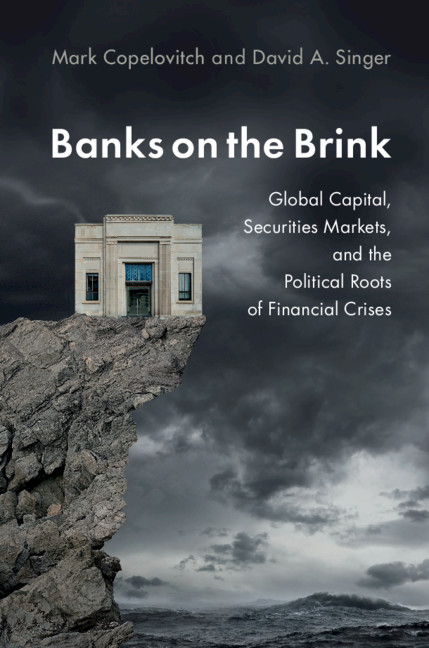Banks on the Brink
This innovative analysis investigates a complex issue of tremendous economic and political importance: what makes some countries vulnerable to banking crises, while others emerge unscathed? Banks on the Brink explains why some countries are more vulnerable to banking crises than others. Copelovitch and Singer highlight the effects of two variables in combination: foreign capital inflows and the relative prominence of securities markets in the domestic financial system. Foreign capital is the fuel for banks' potentially dangerous behavior, and banks are more likely to take on excessive risks when operating in a financial system with large securities markets. The book analyzes over thirty years of data and provides historical case studies of two key countries, Canada and Germany, each of which explores how political decisions in the 19th and early-20th centuries continue to affect financial stability today. The analyses in this book have crucial policy implications, identifying potential regulations and policies that can work to protect banking systems against future crises.
- Stresses the under-explored relationship between banking systems, securities markets, and financial crises, illuminating the profound impact of factors on subsequent crises
- Highlights the impact politics has on the development of a nation's financial markets, across space and time, in order to point out when and why banking systems become more prone to crisis
- Uses comprehensive data analysis, in tandem with two historical case studies, Canada and Germany, in order to expand the study of financial crises beyond singular events and focus on enduring, institutional factors
Reviews & endorsements
‘This book is really interesting, and potentially very important for our understanding of crises and for public policy. Copelovitch and Singer advance a thesis that is quite different, and considerably more subtle, than the standard accounts of why legislators tolerate fragile financial systems. This survives its own tests. I hope others pick up the challenge.' Paul Tucker, Harvard University
‘The best scholarship in political economy combines macroeconomics with a deep sense of its social and historical embeddedness. Copelovitch and Singer's work is such a masterpiece … This book is not only a brilliant empirical investigation, but also a compelling history of the financial development of Canada and Germany. Anybody interested in financial market stability, from regulators to scholars and journalists, should read this work.' Mark Manger, University of Toronto
‘Copelovitch and Singer provide a compelling, comprehensive, and well-written analysis of why some countries are prone to banking crises while others are not. By demonstrating how the institutional context and the availability of international capital jointly shape banks' propensity to engage in risky behavior, this impressive book makes an important and timely contribution to our understanding of how globalization affects the stability of the world economy.' Stefanie Walter, Universität Zürich
‘Modern economic history is littered with banking crises that devastate economies and polarize politics. In Banks on the Brink, Mark Copelovitch and David Singer analyze the sources of these crises. They argue that domestic financial-market conditions, especially the role of securities markets, and international capital flows are responsible for banking crises. Their careful logic, statistical analyses, and detailed case studies make compelling reading for anyone interested in the economics and politics of finance.' Jeffry Frieden, Harvard University
‘Much recent work on banking crises focuses on emerging market economies in East Asia and Latin America. This timely book instead asks why there are banking crisis in developed economies and what policy-makers can do about them. As in the emerging market cases, the authors find that capital flows from abroad are an important potential trigger for banking crises. But what sets the developed world apart is the potential use of such capital and the structure of their financial systems, which are linked. As the case studies for Canada and Germany indicate, banks in countries with underdeveloped securities markets do not face pressure to channel this ‘hot' capital to risky uses. In countries with developed security markets, however, risky behaviour is more likely, as are then banking crises. The policy implications follow convincingly from the analysis – address large current account deficits and increase capital requirements. Anyone interested in understanding crises and how to make them less frequent should read this book.' Mark Hallerberg, Hertie School of Governance
‘This book compares the two designs and focuses on financial market disintermediation and the importance of cross-border capital flows to explain the degree of financial instability in the two countries. Key lessons (and a few surprises) are drawn from the two cases for policy initiatives to contain damaging instability at tolerable costs to financial efficiency and innovation.’ I. Walter, Choice
Product details
April 2020Hardback
9781108489881
252 pages
235 × 159 × 19 mm
0.49kg
42 b/w illus.
Available
Table of Contents
- 1. The politics and economics of financial instability
- 2. Banking crises, capital flows, and financial market structure
- 3. Capital inflows, market structure, and banking crises: empirical evidence
- 4. O Canada? Unraveling the mystery of Canadian bank stability
- 5. Finanzplatz Deutschland: German bank stability and its decline
- 6. Policy responses: what to do (and not to do) about financial instability.











